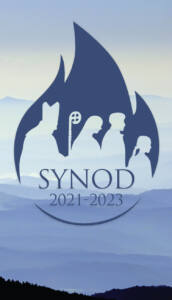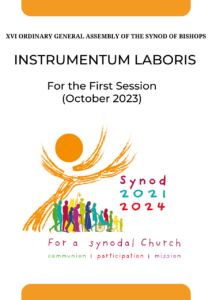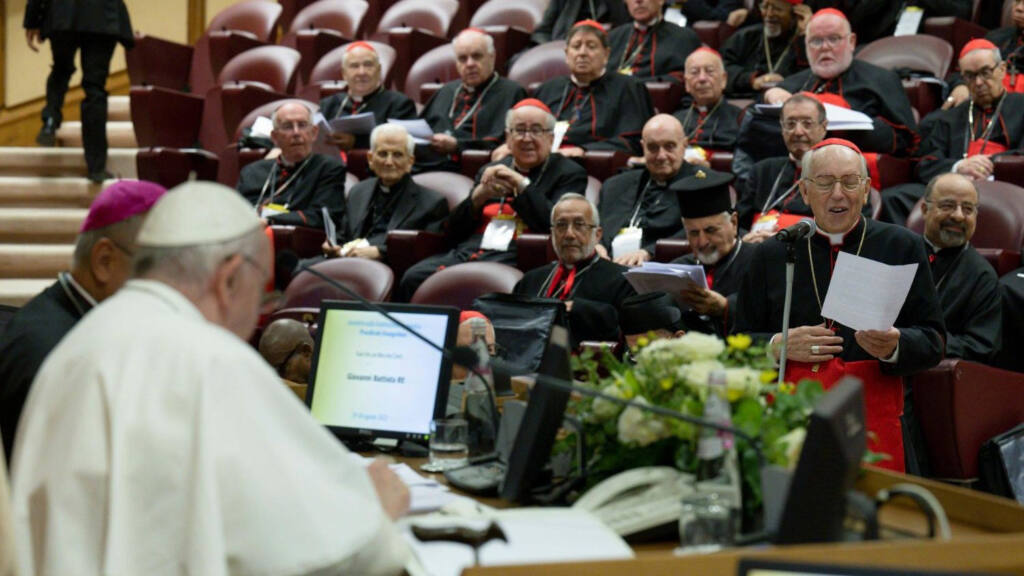
WelCom August 2023
The Vatican’s General Secretariat of the Synod published the Instrumentum laboris on 20 June 2023. The document, which calls for a welcoming Church that embraces diversity, will guide the work of the participants in the two-part General Assembly that will meet in Rome in October 2023 and in October 2024.
The Vatican’s General Secretariat of the Synod has published the Instrumentum laboris or ‘working tool’ that will guide the work of the two-part General Assembly of the Synod on Synodality.
The Instrumentum laboris will be the basis for the work of synod participants in the General Assembly, which begins in the Vatican in October 2023 and concludes with a second Assembly one year later.
The text signals the beginning of a new phase of the Catholic Church’s multiyear Synod on Synodality. Drawing on listening sessions already conducted worldwide at the diocesan, national, and continental level, it covers such hot-button topics as women deacons, priestly celibacy, LGBTQ outreach, and highlights a desire for new institutional bodies to allow for greater participation in decision-making by the ‘People of God’.
At the same time, some of the questions it frames for discussion allude to possible major changes in how the Church operates around the world, through the embrace of an open-ended ‘synodal’ process that entails ongoing dialogue and discernment. The approach is so different, in fact, the document states, that new formation programmes will need to be developed ‘at all levels of ecclesial life and for all the baptized,’ adding that candidates for ordained ministry ‘must be trained in a synodal style and mentality’.
…some of the questions it frames for discussion allude to possible major changes in how the Church operates around the world, through the embrace of an open-ended ‘synodal’ process that entails ongoing dialogue and discernment.
Deliberately conceived as a starting point and not a point of arrival, the Instrumentum laboris brings together the experiences of dioceses around the world over the last two years, starting from 10 October 2021, when Pope Francis set in motion a journey to discern what steps to take ‘to grow as a synodal Church’. The Instrumentum laboris, therefore, is intended as an aid for discernment during the General Assembly, while at the same time serving as a means of preparation for participants as it looks ahead to the gathering.
‘Indeed, the purpose of the synodal process’, the document states, repeating the words of the earlier Document for the Continental stage, ‘is not to produce documents but to open horizons of hope for the fulfilment of the Church’s mission’.

The nearly month-long synod assembly will bring together Catholic bishops, priests, religious, and laypeople from around the world. For the first time, about 21 per cent of the voting delegates in the Synod of Bishops will not be bishops, with 70 delegates chosen directly by the Pope from among a list of 140 laypeople, priests, consecrated women, and deacons selected by the leadership of this year’s continental synod meetings.
The main objective of the first session in October 2023, according to the Instrumentum Laboris, will be to design a plan of study in a ‘synodal style’ and to indicate who will be involved in those discussions. Discernment will be ‘completed’ in the 2024 session of the synod.
The Instrumentum laboris is composed of an explanatory text and 15 worksheets that reveal a dynamic vision of the concept of ‘synodality’. Specifically, there are main sections:
- Section A highlights the experience of the past two years and indicates a way forward to become an ever more synodal Church;
- Section B – entitled ‘Communion, Mission, Participation’ – focuses on the three priority issues at the heart of the work to be done in October 2023. These are elaborated in three main themes:
– growing in communion by welcoming everyone, excluding no one;
– recognising and valuing the contribution of every baptised person in view of mission; and
– identifying governance structures and dynamics through which to articulate participation and authority over time in a missionary synodal Church.
‘Rooted in this awareness,’ the document affirms, ‘is the desire for a Church that is also increasingly synodal in its institutions, structures, and procedures’. It notes that a synodal Church is first and foremost a ‘Church of listening’ and therefore ‘desires to be humble, and knows that it must ask forgiveness and has much to learn’. It continues, ‘The face of the Church today bears the signs of serious crises of mistrust and lack of credibility. In many contexts, crises related to sexual abuse, and abuse of power, money, and conscience have pushed the Church to undertake a demanding examination of conscience so that “moved by the Holy Spirit” the Church “may never cease to renew herself”, in a journey of repentance and conversion that opens paths of reconciliation, healing, and justice.’
Indeed, the purpose of the synodal process is not to produce documents but to open horizons of hope for the fulfilment of the Church’s mission.
A synodal Church is also ‘a Church of encounter and dialogue’ with believers of other religions and with other cultures and societies. It is a Church that ‘is not afraid of the variety it bears,’ but on the contrary, ‘values it without forcing it into uniformity’. The Church is synodal when it is unceasingly nourished by the mystery it celebrates in the liturgy, during which it experiences everyday ‘radical unity’ in the same prayer, in the midst of a ‘diversity’ of languages and rites.
Other significant passages concern:
- the question of authority (‘Does authority arise as a form of power derived from the models offered by the world, or is it rooted in service?’ is one of the questions);
- the need for ‘integral formation, initial and ongoing’ for the People of God; as well as
- the need for ‘a similar effort’ aimed at the renewal of the language used in the ‘liturgy, preaching, catechesis, sacred art, as well as in all forms of communication addressed to the Faithful and the wider public, including through new or traditional forms of media.’ The renewal of language, the text states, must ‘aim to make these riches accessible and attractive to the men and women of our time, rather than an obstacle that keeps them at a distance.’
The document of some 60 pages was written by a committee of 22 people in April and May and approved by Pope Francis. The text itself stresses that it is ‘not a document of the Church’s Magisterium, nor is it the report of a sociological survey’ but instead presents the ‘priorities that emerged from listening to the People of God’ in the global synod process thus far.
Sources: Vatican News, Catholic News Agency, NCR
